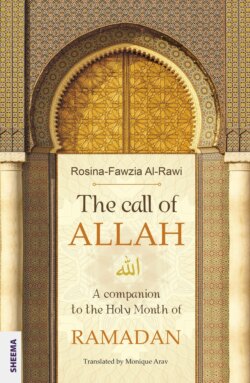Читать книгу The call of ALLAH - Rosina-Fawzia Al-Rawi - Страница 18
На сайте Литреса книга снята с продажи.
Оглавление7th day of Ramadan
DHIKR
REMEMBRANCE
The Prophet said, “When you pass by the gardens of Paradise, then enjoy the abundance.” They asked: “And what are the gardens of Paradise?” He said: “The gatherings of remembrance, dhikr.”20
In its essence, dhikr means to give up our ego’s (nafs) wishes, demands and pictures, and to be with God. It is to keep the rope, ḥabl, between us and Allah always in our heart: “And hold fast, all together, unto the bond (rope) with God, […].” (3:103)
Dhikr enables us to shake the foundations which separate us from our true self and to overcome our feeling of isolation which our nafs always wants to pass off as reality.
Dhikr grants us strength and protection, while softening our heart so that we become “like wool in God’s hands”. Dhikr enables us to step out of the sphere of isolation and into the all-encompassing space of love and peace.
In the Qur’an, Allah says, “and remembrance, dhikr, of God is indeed the greatest good” (29:45) and our beloved Prophet says “The purest by Allah, that which elevates us most, is the remembrance, dhikr, of Allah, the Sublime.”21
Fasting weakens our body so that the power and control of the ego, nafs, abates and we have a chance to get a deeper insight into ourself. Indeed our ego prevents us from experiencing our true self which is the unity of our being, harmony and contentment with Allah. Fasting shatters the shiny palace which we have taken such pains to build up. To a certain extent, fasting turns us into a ruin.
Yet ruins are much more exposed to the light, above all the light of humility, than the palace. In our weakness, we feel how deeply we depend on Allah and His great love for us. In our weakness, we feel His blessing. What a freedom, what a deep joy arises!
I AM NOT ALONE. I AM NOT ISOLATED. I AM NOT A LEAF MOVED BY THE
ARBITRARY WINDS OF LIFE. I HAVE ROOTS, I AM ROOTED IN ALLAH’S
ALMIGHTINESS, POWER AND LOVE. I SURRENDER. I GIVE IN AND I SURRENDER TO
YOUR INFINITE WISDOM AND JUSTICE.
Then begins the deep, reverent remembrance, dhikr: “And bethink thyself (dhikr) of thy Sustainer humbly and with awe, and without raising thy voice, at morn and at evening; and do not allow thyself to be heedless (ghafla).” (7:205)
Through fasting and dhikr, the nafs comes to understand that it is not in this world to rule in splendid isolation. It starts turning to the light of the soul and begins to serve the soul – and the soul always knows that it belongs to Allah alone.
The opposite of dhikr is ghafla, namely the slumbers of forgetting. In His love and compassion, Allah shows us what this does to us: “and be not like those who are oblivious of God, and whom He therefore causes to be oblivious of [what is good for] their own selves: […].” (59:19)
We all know about forgetting and some of us blame ourselves almost cruelly when we have fallen into ghafla or become entangled in other weaknesses.
Come out of this state of blame by immediately holding your weaknesses to Allah and saying astaghfirullāh and alhamdulillāh!
Astaghfirullāh, I take refuge in You and I ask You to forgive me for all my weaknesses, my heedlessness, my ghaflas.
Alhamdulillāh, You are forever praised for the eternal mercy and kindness You keep bestowing upon me.
And together: astaghfirullāh and alhamdulillāh for all the states and possibilities which, in Your kindness, You keep giving me to come closer to You.
Remain in dhikr, in the remembrance of your heart. Through dhikr, through your trust and your gratefulness, teach your mind to free itself from the negative, always doubting and self-pitying interpretations, and to open to Allah’s light and love.
Dhikr is an inner act of surrender which expresses itself on the outer level by participating in shaping this world:
“[and] who remember God when they stand, and when they sit, and when they lie down to sleep, and [thus] reflect on the creation of the heavens and the earth: […].” (3:191)
We human beings are inclined to the good as well as to the bad, but we can only find our inner peace by being close to God and by remembering Him, for our true nature knows God.
Yet the most beautiful thing about dhikr is that Allah tells us that when we remember Him, He remembers us: “so remember Me, and I shall remember you; and be grateful unto Me, and deny Me not.” (2:152)
MAY OUR FAST BE NURTURED BY DHIKR.
PRACTICE SUGGESTED FOR TODAY
Today, try and remember or recite, silently or aloud, as often as you can
astaghfiru llāh wa-I-ḥamdu li-llāh
astaghfiru llāh, I take refuge in You and I ask You to forgive me for all my weaknesses, my heedlessness, my ghaflas.
al-ḥamdu li-llāh, You are forever praised for the eternal mercy and kindness You keep bestowing upon me.
DID YOU KNOW…
The now common prayer beads (masbaḥa in Arabic, subha in Turkish and Farsi) were not used in the early days of Islam. The believers would either use their fingers or pebbles to count formulas.
The first caliph, Abu Bakr As-Siddiq, introduced the first type of masbaḥa in the form of a knotted rope.
The masbaḥa as we know it today was introduced by Junayd Al-Baghdadi (d. 910), one of the main authorities on Sufism, who wanted to give his students a permanent tool for remembrance as well as something to hold on to and orientate themselves by.
